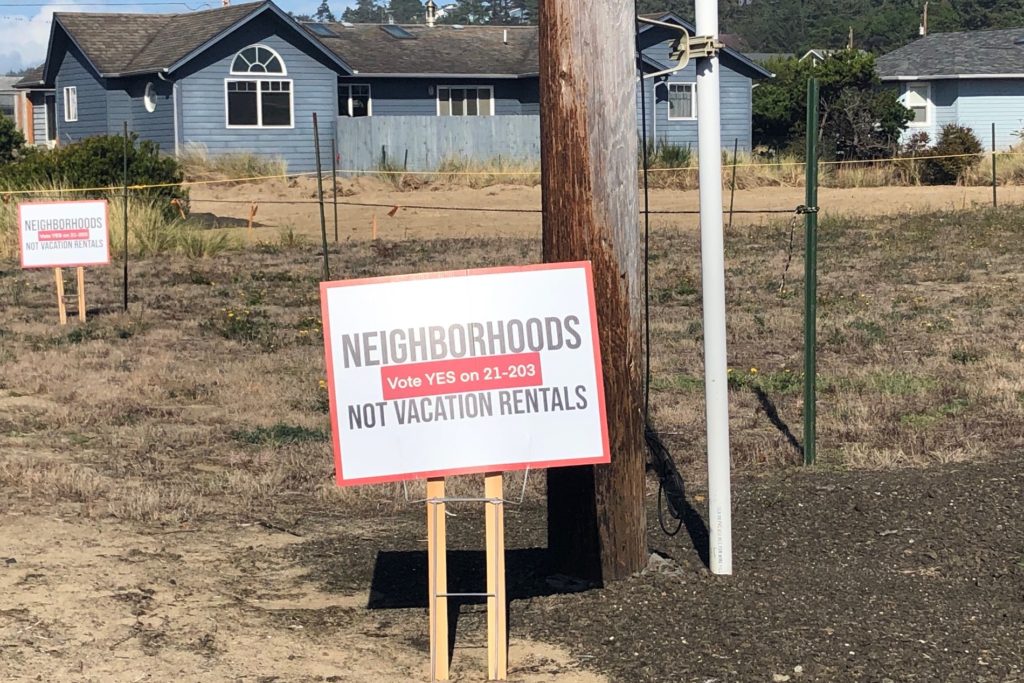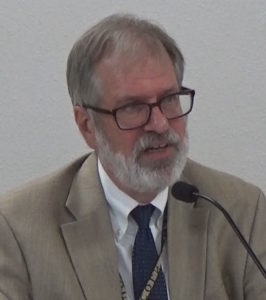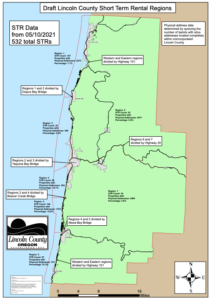
BY QUINTON SMITH/YachatsNews.com
Calling it a “giant step” toward addressing issues with vacation rentals in unincorporated areas of Lincoln County, commissioners voted unanimously Wednesday on a wide-ranging set of new rules governing their numbers and use.
But proponents and opponents of a separate vacation rental measure on next Tuesday’s ballot were not impressed, calling the commissioner’s work either incomplete or an infringement of property rights.
The revised ordinance on short-term rentals in unincorporated areas outside of cities takes effect in 90 days – Jan. 25.
But assistant county counsel Wayne Belmont said staff still had a lot of work to do on several aspects of the ordinance and that commissioners still had decisions to make in implementing it.

“It’s not in its final form nor in its perfect form,” said commission chair Doug Hunt. “But it is a giant step toward addressing the very complicated issue of vacation rentals.”
After no work on the issue since May, Wednesday’s vote came after a first reading of the ordinance two weeks ago and was clearly intended to be passed before Lincoln County voters finish casting ballots Tuesday on the hotly-debated Measure 21-203. That measure would phase out short-term rentals in residential zones of unincorporated Lincoln County over five years.
There are currently 523 licensed vacation rentals in the county, down from more than 600 when commissioners began discussing the issue in 2019 and put a moratorium on new licenses.
The county’s revised ordinance would:
- Set license caps in seven areas of unincorporated county and use attrition – licenses cannot be transferred to heirs or new owners — to lower the number of rentals west of U.S. Highway 101 and allow more licenses east of Highway 101;
- Decrease occupancy limits three people per sleeping area plus two additional to a limit of two people per sleeping area plus two. The lower occupancy limit applies at all times and is intended to prevent large gatherings like weddings or parties at rentals;
- Tighten septic inspections and standards, which could also be used to limit occupancy but phased in to allow certified companies time to complete inspections; and
- Set up an administrative hearings process to handle chronic offenders cited by the sheriff’s code enforcement deputy.
More work on “zones”
The county’s moratorium on new licenses – already extended four times as commissioners worked nearly two years on the issue — expires Nov. 30. But Belmont and Hunt indicated the moratorium would have to be extended at least until January if the county intended to lower the overall number of licenses.
Belmont also said staff will have to return with specifics on a plan first floated in May to create five “neighborhood” zones on the west side of U.S. Highway 101 where there are specific, different and lower limits on the number of licenses.

“We have additional work to do on this, including public input,” he said, adding that staff work and commission approval would all need to be done before the ordinance took effect in 90 days.
But when staff does come back with recommendations for the five zones, Hunt and Commissioner Claire Hall asked Belmont to address some “extreme concentrations” of rentals in some neighborhoods west of Highway 101.
Commissioner Kaety Jacobson said she was looking for more detailed or precise numbers in each zone.
“It may be difficult to implement, but we need to try,” she said.
The county is looking at five “zones” west and two east of Highway 101.

There are currently 455 licenses in the five zones west of Highway 101, according to county data. Those would drop through attrition to 360 under proposed percentages for each zone. Under the formula, the number of licenses east of Highway 101 would be allowed to increase from the current 77 to 138.
The zones, the number of vacation rentals now and under the proposed percentages are:
- Zone 5: From the north city limits of Yachats to the city of Waldport — 87 rentals which are 23.3 percent of all addresses; drops to 49 rentals at 13 percent;
- Zone 4: From the Bayshore community north of Waldport to Beaver Creek north of Seal Rock — 146 rentals, 10.6 percent of all addresses; drops to 117 rentals at 8.5 percent;
- Zone 3: From Beaver Creek to the south edge of Newport — 40 rentals, 14.1 percent of all addresses; drops to 28 rentals at 10 percent;
- Zone 2: From the north edge of Newport to the south limits of Depoe Bay — 25 rentals, 5.6 percent of all addresses; drops to 22 rentals at 5 percent;
- Zone 1: From Depoe Bay to Lincoln City — 157 rentals, 7.1 percent of all addresses; drops to 144 rentals at 6.5 percent;
- Zone 6: All the unincorporated county east of U.S. 101 from Lincoln City in the north to Highway 20 in the south — with 43 rentals, 0.9 percent of all addresses; increases to 70 at 1.5 percent;
- Zone 7: All of unincorporated county east of U.S. 101 from Highway 20 in the north to the Lane County line in the south — 34 rentals at 0.8 percent of all addresses; increases to 67 at 1.5 percent.
Two groups not pleased
A neighborhood group trying to tighten restrictions on short-term rentals through the ballot measure and an advocacy group for rental owners and managers did not have kind words for the commissioners’ work.
Via Oregon, the owner/management coalition formed to fight the ballot measure, contended in a statement to YachatsNews that the commissioners’ work “takes away the rights of Lincoln County homeowners who have never had a complaint of over-occupancy, noise violation, garbage violation, or improper parking.
“Homeowners who had one expectation under the zoning code when they purchased their property, now face their previously allowed short-term rental use taken away by new occupancy limits and a ban on passing the home on to their heirs as a rental,” the Via Oregon statement said.
“The most disappointing aspect of the Commissioners’ actions is the ‘us vs them’ approach of targeting short-term rental owners, managers, and employees as if they are ‘others’ to be driven out of the community with a chokehold of one-size-fits-all regulations,” their statement said.
15neighborhoods, the group that collected more than 1,400 signatures to get Measure 21-203 on the Nov. 2 ballot, chided commissioners for not taking testimony – just asking for letters and emails — since last winter, for not responding to ideas or arguments they say could have improved the ordinance, and lack of deeper discussion by the three elected officials during the meetings when Belmont laid out the proposals.
“There is a pattern here in the failure to address in the STR ordinance for over two years,” 15 neighborhoods said in a statement. “No data were presented. No alternatives were analyzed in public view. Workshops were one-way ‘listening sessions’ that became public gripe sessions. There was no task force committee, no item-by-item addressing the input from both sides
“Finally, without explanation and one month before the temporary suspension was set to expire, a rush to adopt the ordinance was made for no ostensible reason than to beat the Nov. 2 election on 21-203,” the group said.



Unless you have read Measure 21-203, would you believe that the phase-out of fewer than 530 short-term rentals from residential neighborhoods outside the cities would tank the cities?
We are not a tourist economy, according to the most recent 10-year update on Lincoln County’s economy (2014).
According to the report at page 6, the sources of total personal income by sectors include:
Transfer Payments 22.8% (Retirees)
Commercial fisheries 8.1%
Tourism 7.5%
Timber 5.1%
“In general, the tourism sector pays lower salaries than many other sectors of the economy.” In fact, the median income in Lincoln City was $29,686 compared to Lincoln County medial income of $41,996 … the lowest in the entire County.“ Executive Summary, page 6
It’s important to separate the truth from the lies. Voting Yes on 21-203 is the best way forward for a healthy, strong and viable future for our community. Read the full-text of Measure 21-203 at http://www.15neighborhoods.com
Below is a restatement of an argument Via Oregon knows is not true. It was to do with the Business License to operate a STR. There is no constitutional right to pass on a Business License to heirs of a dwelling that may have a Business License any more than there is a right to pass on a Business License to operate a food cart.
Let them sue the County about this feature of the Code. Or they can sue the County when YES on 21-203 passes because we have the same feature: A Business License is not transferable.
The Land Use Board of Appeals has already ruled on this issue, and LUBA’s opinion is that Business Licenses are not a justiciable land use under zoning.
Meredith tends to sue, scare everyone to back down, and then settle with a “gag order.” These are called SLAPP law suits. We will all see what they do.
Via Oregon’s excerpt from their Statement, above:
“Homeowners who had one expectation under the zoning code when they purchased their property, now face their previously allowed short-term rental use taken away by new occupancy limits and a ban on passing the home on to their heirs as a rental,” the Via Oregon statement said.